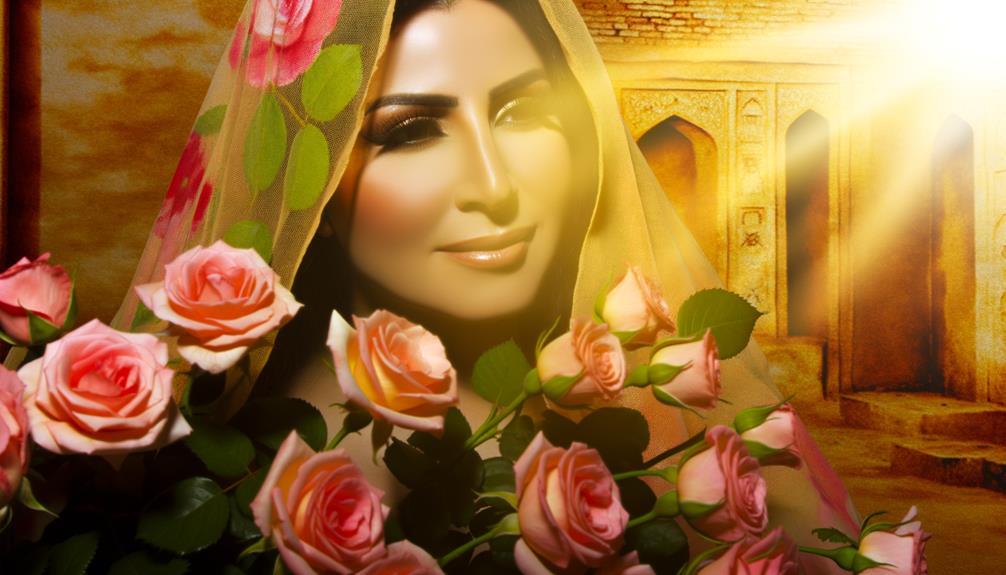Meaning of the Name Roxana
The name Roxana, with origins in ancient Persia's Old Persian word 'Raoxshna,' means 'bright' or 'shining.' Historically, it gained prominence through Roxana of Bactria, wife of Alexander the Great. Culturally, Roxana conveys themes of light, hope, and resilience, symbolizing feminine strength and new beginnings.
The name has evolved into variations such as Roxane and Roxanne, reflecting different cultural influences. Famous bearers include literary characters and modern figures like journalist Roxana Saberi.
Roxana's increasing popularity underscores its timeless appeal and cultural richness. Discover more about its historical journey and significance.

Key Takeaways
- Roxana means 'bright' or 'shining,' derived from the Old Persian word 'Raoxshna.'
- The name symbolizes dawn, light, hope, and renewal in Persian culture.
- Roxana reflects themes of feminine strength, resilience, and empowerment.
- Variations of the name include Roxane, Roxanna, Roxanne, and Roshanak.
- Roxana's historical and literary significance adds to its timeless appeal and modern popularity.
Historical Origins
The name Roxana can be traced back to ancient Persia, where it was derived from the Old Persian word 'Raoxshna,' meaning 'bright' or 'dawn.' This etymology underscores its linguistic roots and cultural context in the Achaemenid Empire.
Roxana gained historical prominence as the name of Alexander the Great's wife, Roxana of Bactria, which further cemented its association with nobility and influence. The name's transmission through various cultures and languages, including Greek (Roxane) and Latin (Roxana), highlights its adaptability and enduring appeal.
This historical journey reflects the name's integration into different societies while preserving its original connotations of luminosity and new beginnings. Therefore, Roxana's historical origins offer a rich tapestry of linguistic and cultural intersections.
Cultural Significance
Beyond its historical origins, Roxana's cultural significance extends into various traditions, where it embodies themes of brightness, new beginnings, and feminine strength.
In Persian culture, Roxana, or 'Roxaneh,' symbolizes dawn and light, often associated with hope and renewal. This interpretation aligns with the name's historical bearer, Roxana, the wife of Alexander the Great, who played a crucial role in both political and cultural spheres.
Additionally, in literature and the arts, Roxana frequently appears as a character representing resilience and charisma, reinforcing its association with feminine empowerment. These cultural threads collectively enhance the name's rich tapestry, making Roxana a timeless choice that resonates with notions of inner strength and optimistic prospects across diverse communities.
Etymology and Variations
Etymologically, the name Roxana derives from the Old Persian 'Raoxshna,' meaning 'bright' or 'shining,' and has evolved through various languages and cultures into numerous variations.
In ancient Greek, it transformed into 'Roxane,' maintaining its original connotation. This name further spread to Latin as 'Roxana,' gaining popularity in European contexts. Variations such as 'Roxanne' in French and 'Roxanna' in English demonstrate linguistic adaptations while retaining the core meaning.
Additionally, 'Roksana' appears in Slavic languages, and 'Roshanak' is a Persian diminutive. Each iteration reflects specific phonetic and cultural influences, illustrating the name's versatility and enduring appeal.
These variations highlight the name's journey through history, adapting to distinct linguistic landscapes while preserving its luminous essence.
Famous Bearers
Throughout history, the luminous essence of the name Roxana has been embodied by numerous notable figures across various fields and cultures.
One of the earliest and most prominent bearers is Roxana, the Bactrian princess who married Alexander the Great, symbolizing unity between East and West.
In literature, Roxana is immortalized in Daniel Defoe's novel 'Roxana: The Fortunate Mistress,' where the character navigates complex social dynamics.
In the field of performing arts, Roxana Zal, an Emmy Award-winning actress, exemplifies the name's contemporary resonance.
Additionally, Roxana Saberi, an American journalist of Iranian descent, is recognized for her courageous reporting.
Each of these individuals has contributed to the name's enduring legacy, reflecting its historical and cultural richness.
Modern Popularity
In recent years, the name Roxana has witnessed a resurgence in popularity, reflective of its timeless appeal and cross-cultural significance. This revival can be attributed to multiple factors, including its historical roots and graceful phonetic structure.
The name Roxana, rooted in Persian origin meaning 'dawn' or 'bright,' appeals to parents seeking a name that embodies both strength and elegance. Additionally, its adaptability across various cultures and languages enhances its widespread acceptance.
Data from recent baby name registries indicate a notable uptick in its usage, particularly in Western countries. This trend underscores a broader inclination towards names that are both historically rich and distinctively beautiful, making Roxana a compelling choice for modern parents.
Conclusion
The name Roxana, rich in historical and cultural significance, originates from the ancient Persian and Greek worlds. Etymologically rooted in the Old Persian 'Raoxshna,' meaning 'bright' or 'dawn,' it has variations across numerous cultures.
Notable bearers such as Roxana, wife of Alexander the Great, underscore its historical prominence.
An interesting statistic reveals that in 2020, Roxana ranked among the top 1,000 baby names in the United States, reflecting its enduring appeal in modern times.






